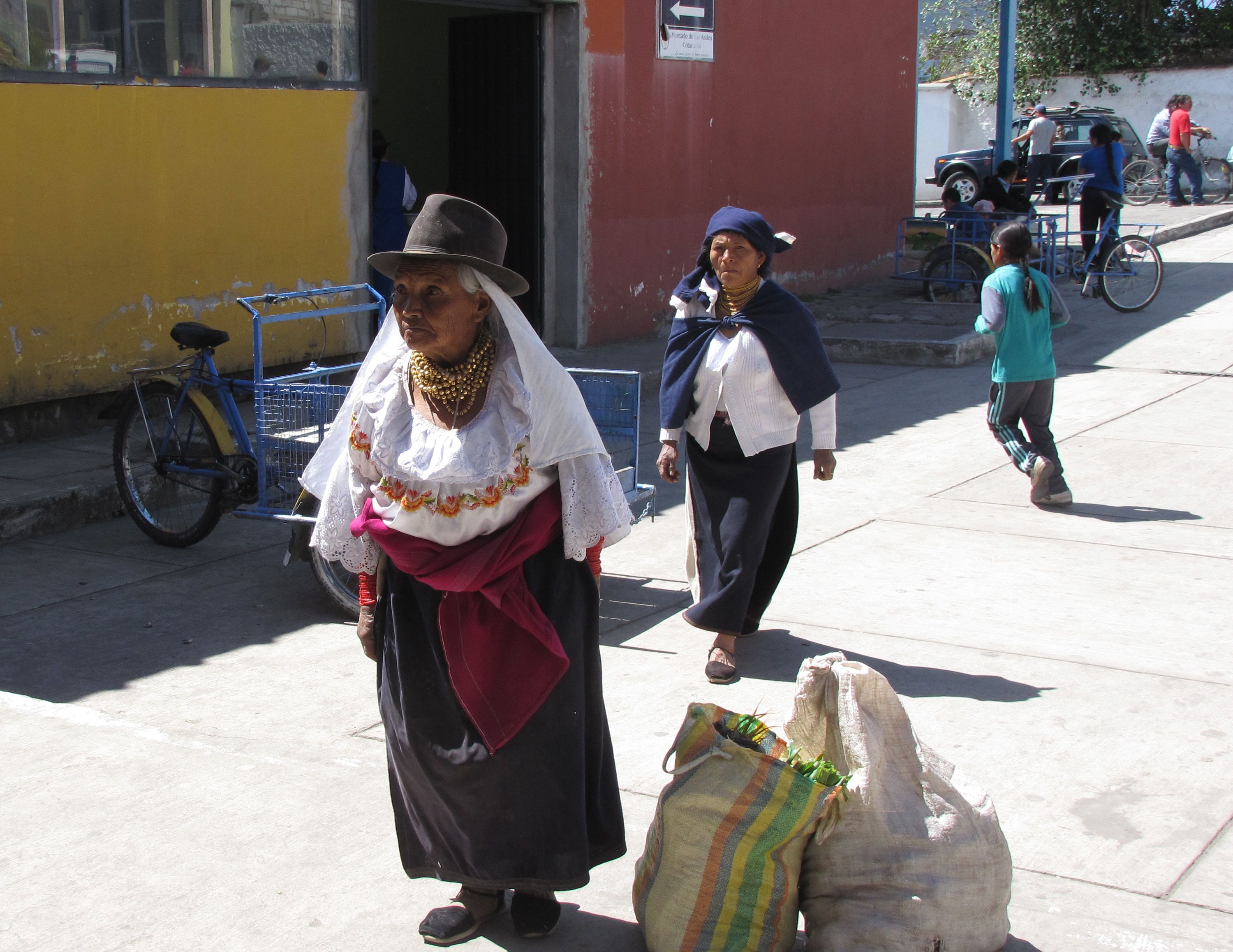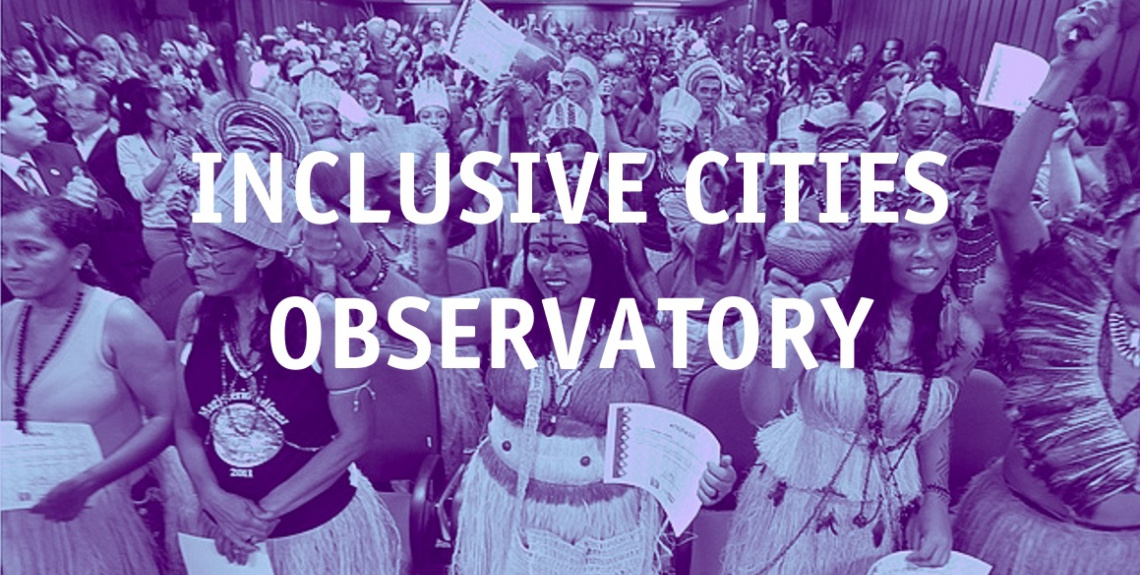Within the framework of the transformative political process carried out since 1996 in Cotacachi's cantón (Ecuador), local institutions have placed special emphasis on enhancing and strenghtening women and indigenous population participation in local public affairs. These efforts sought to raise awareness among the population about their rights and duties, under the firm commitment to create a new model of local development based on citizen participation, collective planning, transparency and self-management.
The canton of Santa Ana de Cotacachi is located in the Imbabura Province in Ecuador with more than 37,250 inhabitants (of which 80% live in rural areas). The municipality is strongly marked by ethnic and cultural diversity: 60% of people are indigenous Quechua, 35% are white-mestizo, and 5% are Afro-Ecuadorian.
Its rural population has traditionally been relatively excluded from development processes, with poor access to potable water and sewerage and one of the highest child mortality rates in the country. The municipality has an annual budget of 3 million dollars and until 1996 it was run by the white-mestizo community as the indigenous majority was politically subordinate, economically pauperized, and socially excluded. Segregation was especially hitting indigenous women in the rural area.
The election of the indigenous Mayor Auki Tituaña in 1996 (and his subsequent re-elections in 2000 and 2004) modified the local governmental structures. After the institution of the Annual Cantonal Unity Assemblies and Women’s Coordinating Committees, women’s participation became increasingly active and propositional with the creation of participatory budgeting in 2002.
Main goals of the project
The main goals of participatory budgeting proposed by local authorities were to promote social, ethnic, inter-generational and, especially, gender-based participation and organization; bring transparency to the management of the municipal budget; and achieve self-management that places a value on the economic contribution of the community. In 2003, a Follow-up or Oversight Committee (made up of members of the community) was added, in order to oversee the implementation of the approved programs and works. In 2003, a major goal was added to the Cotacachi Participatory Budget experimentation: encouraging the participation of women, especially in rural areas, through the creation of gender-differentiated and positive discrimination measures.
See the whole case study on Cotacachi's cantón
Through specific workshops aimed at creating a collaborative environment where indigenous women could feel ‘at ease’ and overcome traditional passive behavior when confronted in the public scene, their participation increased and their community organizing capacity was strengthened. The use of the native language of the local communities, as well as of pedagogical resources employing colors, symbols (dried fruits and seeds), and other daily materials helped a lot.
Outcomes
The ascent and empowerment of the women of Cotacachi in the participatory budgeting process implied a series of transformations in municipal management and policies:
- Through special training, a municipal technical team received specialized skills in participatory techniques, which was reinforced with a mostly female team.
- Importantly, the policies and projects aimed to enhance the living conditions of women and their families, which were discussed within participatory budgeting processes, have contributed to detailing the contents of the Cantonal Development Plan, the Cantonal Health Plan, the Environmental Management Plan, the Parish Plans, and the Community Plans, thus becoming institutionalized through their approval.
- Results of the experimentation were highly visible. In 2003, the ‘Yes I can’ campaign was launched, involving 1667 people (65% women) who were taught to read and write. Since then, 10% of all indigenous women and 20% of all adult women have been taught to read through this program, and Cotacachi has been declared by UN the first illiteracy-free canton in Ecuador.
- Since the application of participatory budgeting, over two-thirds of municipal resources have been allocated to rural areas – in radical contrast to the formulas that had previously been applied. There have been significant improvements in rural electrification, with 95% coverage in the subtropical area, while 12% of the annual budget has been allocated to basic sanitation
- Inside the participatory budget, women have consistently prioritized health care. In 2003, it was decided that the municipality would take control of health care provision (through an agreement with the State which is made possible by Ecuadorian Law) and a local tripartite committee was formed that included the municipality, the community, and health care professionals. The progress made is today considered unique in the country: in a few years, infant mortality has been reduced to 0%, and a holistic health prevention program emerged, assigning resources to improve the areas of maternal-infant care in the medical centers of the canton.
- In addition, the promotion of traditional medicine was approved, which places value on ancestral indigenous knowledge and gives skills to previously informal workers in the area.


@ Dottie Day & Carlos Rodríguez/Andes.
Challenges and prospective scenarios
The Cotacachi experience went, and still seeks to go, beyond the scope of merely distributing and controlling public resources, achieving durable economic, political, social, and cultural impacts. In general terms, it constituted a successful national and international example of municipal management, winning several international awards.
That policy continues to be solidly based on open participation with an emphasis on positive ethnic and gender discrimination, without ignoring more universal rights to participation. The fact that the participatory budgeting and several policies born inside of its range of results had continuation after the electoral defeat of Mayor Auki Tituaña in April 2009 is a proof of the degree of social approval and sustainability they managed to reach.
The Cotacachi case underlines the importance of political will as a precondition to fostering the development of a participation culture in local society, but the institutional actors must assume the risks of empowering people, leaving to social actors a real space to define their policies and control the execution of their projects and works. It also shows that in order for co-decided projects to become real in the urban/rural space (thus feeding-back legitimacy to the participatory process), there must be a high level of inter-institutional articulation and a strong investment in sensitizing and training municipal personnel.
The Inclusive Cities Observatory is a space for analysis and reflection on local social inclusion policies. It contains over sixty case studies on innovative policies for community development, access to basic services, gender equality, environmental protection and the eradication of poverty


